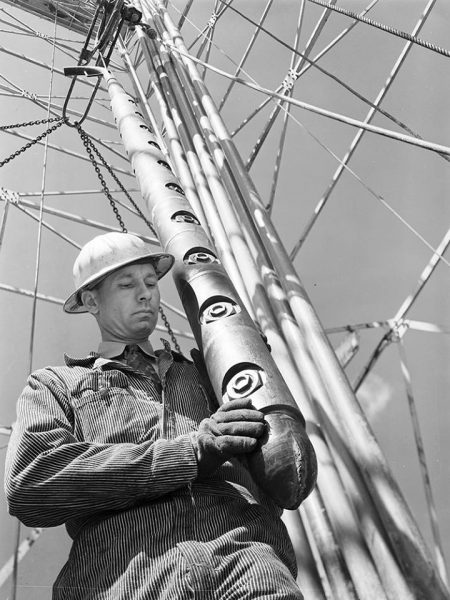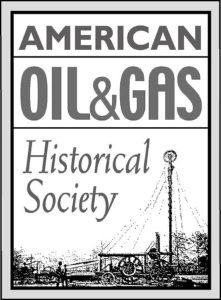Founded in 1932, the oilfield service company Lane-Wells developed powerful perforating guns.
Fifteen years after its first oil well perforation job, Lane-Wells Company returned to the same well near Montebello, California, to perform its 100,000th perforation. The publicity event of June 18, 1948, was a return to Union Oil Company’s La Merced No. 17 well.
The gathering of executives at the historic well celebrated a significant leap in petroleum production technology. The combined inventiveness of the two oilfield service companies had accomplished much in a short time, “so it was a colorful ceremony,” reported a trade magazine.
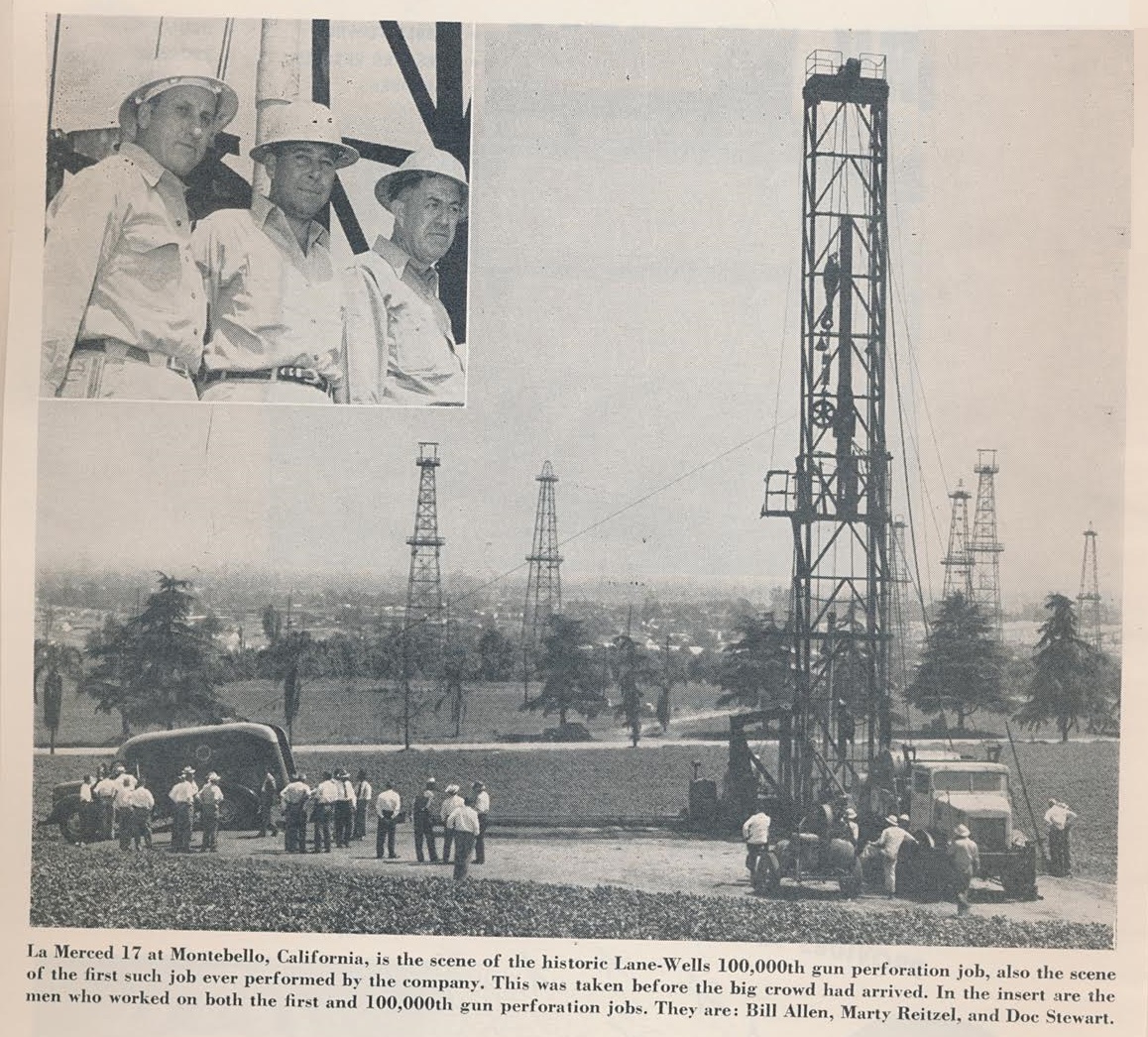
As production technologies evolved after World War II, Lane-Wells developed a downhole gun with explosive energy to cut through well casing. Above, one of the articles preserved in a family scrapbook, courtesy Connie Jones Pillsbury, Atascadero, California.
Officials from both companies and guests gathered to witness the repeat performance of the company’s early perforating technology, noted Petroleum Engineer in its July 1948 issue. Among them were “several well-known oilmen who had also been present on the first occasion.”
Walter Wells, chairman of the board for Lane-Wells, was present for both events. The article reported he was more anxious at the first, which had been an experiment to test his company’s new perforating gun. In 1930, Wells and another enterprising oilfield tool salesman, Bill Lane, developed a practical way of using guns downhole.
The two men envisioned a tool that could shoot steel bullets through casing and into the formation. They would create a multiple-shot perforator that fired bullets individually by electrical detonation. After many test firings, commercial success came at the Union Oil Company La Merced well.
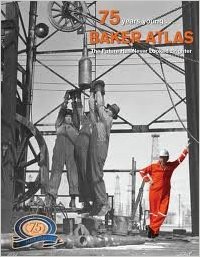
Cover of a special publication featuring the 75th anniversary of Baker Atlas oil well service company. Lane-Wells became part of Baker Atlas, today a division of Baker-Hughes
Founded in Los Angeles in 1932, the oilfield service company Lane-Wells built a fleet of trucks as it became a specialized provider of well perforations — a key service for enhancing well production (see Downhole Bazooka).
The two men designed tools that would better help the oil industry during the Great Depression. “Bill Lane and Walt Wells worked long hours at a time, establishing their perforating gun business,” explained Susan Wells in a 2007 book celebrating the 75th anniversary of Baker-Atlas.
“It was a period of high drilling costs, and the demand for oil was on the rise,” Wells added. “Making this scenario worse was the fact that the cost of oil was relatively low.”
Shotgun Perforator
By late 1935, Lane-Wells recognized high-powered guns were needed for breaking through casing, cement and into oil-bearing rock formations.
An experienced oilfield worker, Sidney Mims, had patented a similar technical tool for this, but he could not get it working as well as it should. Lane and Wells purchased the patent and refined the downhole gun design. Lane-Wells developed a remotely controlled 128-shot perforator — a downhole shotgun.
“Lane and Wells publicly used the re-engineered shotgun perforator they bought from Mims on Union Oil’s oil well La Merced No. 17,” Wells noted. “There wasn’t any production from this oil well until the shotgun perforator was used, but when used, the well produced more oil than ever before.”
The successful application attracted many other oil companies to Lane-Wells as the company modified the original 128-shot perforator to use 6-shot and 10-shot cylinders. For a public relations event, executives decided to conduct the company’s 100,000th perforation almost 16 years after the first at the La Merced No. 17 well.
Continued success in Oklahoma and Texas oilfields led to new partnerships beginning in the 1950s. A Lane-Wells merger with Dresser Industries was finalized in March 1956, and another corporate merger arrived in 1968 with Pan Geo Atlas Corporation, forming the service industry giant Dresser Atlas.
A 1987 joint venture with Litton Industries led to Western Atlas International, which became an independent company before becoming a division of Baker-Hughes in 1998 (Baker Atlas) providing well logging and perforating services. Dresser merged with Halliburton the same year.
Preserving Oil History
Connie Jones Pillsbury of Atascadero, California, and the family of Walter T. Wells wanted to preserve rare Lane-Wells artifacts. She contacted the American Oil & Gas Historical Society for help finding a home for an original commemorative album, press clippings and guest book from June 18, 1948.
Seeking to preserve the “Lane-Wells 100,000th Gun Perforating Job” event at Montebello, California — site of the Union Oil Company La Merced No. 17 well — Pillsbury and the children of Dale G. Jones, the grandson of Walter T. Wells, contacted petroleum museums, libraries, and archives (also see Oil & Gas Families).
Pillsbury’s quest to preserve the Walter T. Wells album and records proved successful, and she emailed AOGHS to report the family’s album was “safely archived at the USC Libraries Special Collections. Sue Luftschein is the Librarian. It’s on Online Archive of California (OAC).”
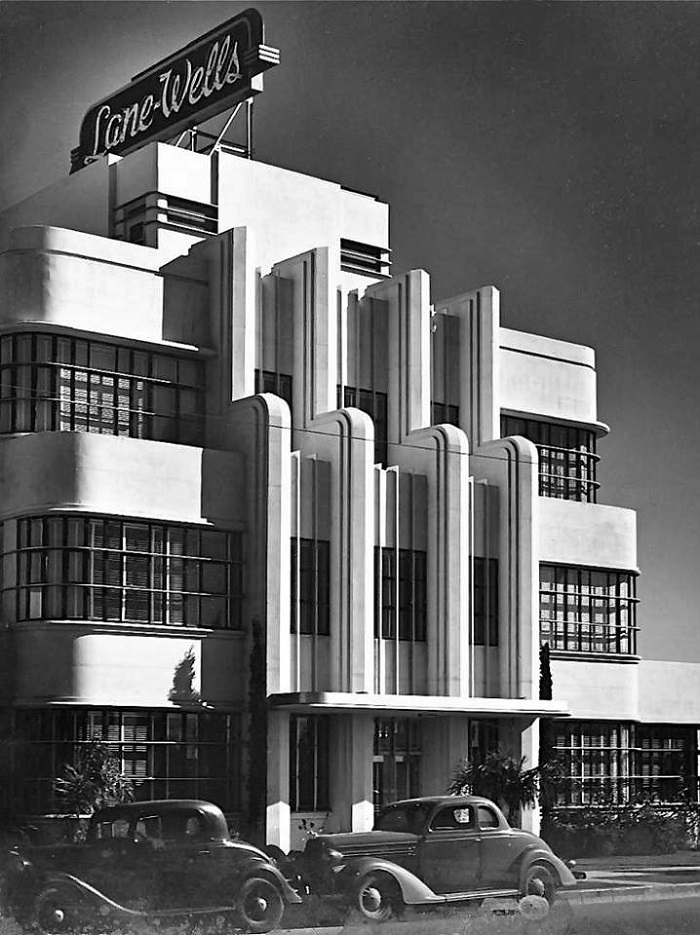
The Lane-Wells West Coast headquarters designed by architect William E. Mayer and completed in 1937 in what became Huntington Park in Los Angeles. Photo courtesy Water and Power Associates.
The Lane-Wells collection — Gift of Connie Pillsbury, October 27, 2017 — can be accessed via the OAC website.
Title: Lane-Wells Company records
Creators: Wells, Walter T. and Lane-Wells Company
Identifier/Call Number: 7055
Physical Description: 1.5 Linear Feet 1 box
Date (inclusive): 1939-1954
The archive abstract also notes:
“This small collection consists of a commemorative album celebrating the 100,000th Gun Perforating Job by the Lane-Wells Company of Los Angeles on June 18, 1948, and additional printed ephemera, 1939-1954, created and collected by Walter T. Wells, co-founder and Chairman of the Board of the Lane-Wells Company.”
Pillsbury sought a museum or archive home for her rare oil patch artifact, which came from an event attended by many from the Los Angeles petroleum industry.
“The professionally-prepared book has all of the attendees signatures, photographs and articles on the event from TIME, The Oil and Gas Journal, Fortnight, Oil Reporter, Drilling, The Petroleum Engineer, Oil, Petroleum World, California Oil World, Lane-Wells Magazine, the L.A. Examiner, L.A. Daily News and L.A. Times, etc.,” Pillsbury noted in 2017.
The 1948 commemorative book, now preserved at USC, “was given to my first husband, Dale G. Jones, Ph.D., grandson of Walter T. Wells, one of the founders of Lane-Wells,” she added. “His children asked me to help find a suitable home for this book. I found you (the AOGHS website) through googling ‘History of Lane-Wells Company.’”
_______________________
Recommended Reading: 75 Years Young…BAKER-ATLAS The Future has Never Looked Brighter (2007); Wireline: A History of the Well Logging and Perforating Business in the Oil Fields
(1990)
. Your Amazon purchase benefits the American Oil & Gas Historical Society. As an Amazon Associate, AOGHS earns a commission from qualifying purchases.
_______________________
The American Oil & Gas Historical Society (AOGHS) preserves U.S. petroleum history. Please become an AOGHS annual supporter and help maintain this energy education website and expand historical research. For more information, contact bawells@aoghs.org. © 2025 Bruce A. Wells.
Citation Information – Article Title: “Lane-Wells 100,000th Perforation” Authors: B.A. Wells and K.L. Wells. Website Name: American Oil & Gas Historical Society. URL: https://aoghs.org/technology/oil-well-perforation-company. Last Updated: June 12, 2025. Original Published Date: June 30, 2017.


